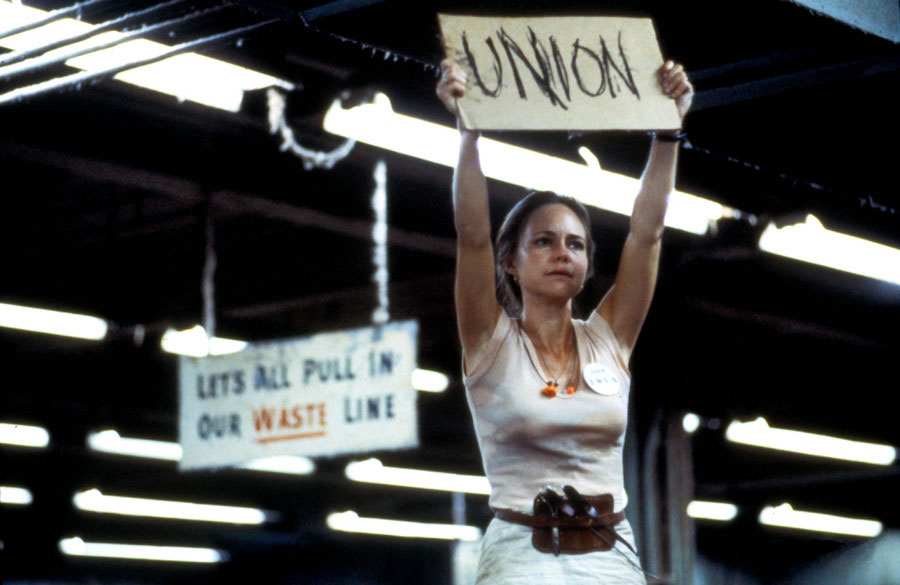
Sally Field knew wassup.
LET’S GET ONE THING STRAIGHT: women voters decide elections.
Thrown behind the biggest issues of our day, with ballots to back it up, our voting power could bring about the kind of changes we can all believe in, including paid parental leave, universal healthcare, and the ERA (Equal Rights Amendment).
These are neither radical, nor unheard of. However, there’s one issue that we hear less about in the day-to-day news, and its one that, if applied universally, would benefit women across the board: pro-union legislation.
Unions are worker-organized groups that negotiate with employers for fair wages, safety measures, and benefits. Through the practice of collective bargaining and protest, unionization gave us the minimum wage, 40-hour workweeks, weekends, pensions, worker’s compensation, medical leave, and even lunch breaks.
But wait, you say. If unions are so great, then why do we need right-to-work states?
The short answer is: we don’t.
Conservatives tout right-to-work legislation as protection from union “oppression.” In these states, workers are not required to join workplace unions, but will continue to benefit from them. This sounds like a good deal, until you realize that right-to-work laws lower union bargaining power.
By reducing collective bargaining power, right-to-work laws allow employers to continue engaging in unethical and dangerous practices with little or no resistance from employees, who have little recourse. After all, if only a small percentage of employees participate in a union, the organization does not have much sway when it comes to affecting workplace change. Additionally, because these workers do not have to pay dues to a union in order to be covered by it, unions in right-to-work states are more likely to suffer from under-funding.
Employees suffer outside the workplace as well. When we say “right-to-work,” what we’re really talking about is the right to work for less money, to paraphrase President Obama. Those in right-to-work states bring home roughly 12 percent less than their peers in pro-union states. They endure staggeringly higher rates of on-the-job fatalities (54.4 percent) and infant mortality (14.2 percent).
On April 12, 2016, women across the U.S. geared up for Equal Pay Day. Because women make only 79 cents for every dollar a man brings home, they must work until April 12 to “catch up” to men and close the wage gap from the previous year. This observance doesn’t represent women of color, however, and so the American Association of University Women hosts four other Equal Pay Days in March, August, September, and October.
Unions help every worker earn more, but they give women and people of color an extra hand. Where unionized men earn 20 percent more than their un-unionized brethren, women see a 30 percent paycheck boost. These benefits are more pronounced for women of color, with Hispanic and black women bringing home 42 and 34 percent more money, respectively, as unionized employees.
Although the gender wage gap has held steady at around 79 percent for years, the pay divide among unionized workers was below 10 percent in 2014: half the size of that among non-unionized employees. Additionally, female union members bring home about 33 percent more each week than their non-unionized peers.
We cannot look at unionization’s effect on the wage gap without examining salary transparency. Many workplaces forbid, or at least frown upon, discussing paycheck size with co-workers. Because of this, women and people of color may believe they are paid the same as their white, male peers, while bringing home much less money. Being able to freely discuss salary differences allows unionized workers to fight employers for fairer pay rates.
In January 2016, seven years after he signed the Lilly Ledbetter Fair Pay Act, President Obama announced a proposal that would require companies to report salary information to the Equal Employment Opportunity Commission (EEOC). When available, this information will be broken down by gender, race, and ethnicity. The new rule should go into effect in 2017.
Even with President Obama’s words and actions, the fight for equal protections and fair workplace practices is far from over. We cannot expect the major changes that we need to take effect without our continued and impassioned involvement in politics. And, as with all movements, we need allies.
So educate yourself on the topics of unions, right-to-work laws, salary transparency, and the multiple gender wage gaps. Write, call, email, and tweet your lawmakers whenever a piece of legislation is introduced that will hinder the pursuit of equality. Don’t let that be enough. Talk to your family and friends about your activism. Tell them what you know, and encourage them to get involved.
It’s true that one person, in general, cannot make much of a difference when it comes to large-scale issues like this one. But if everyone sat on their hands because of that truth, no progress would ever be made. One person can’t change the world, but you can start a mission, help a movement, and make our nation better than it’s ever been.

-300x200.jpeg)









-300x241.jpeg)




